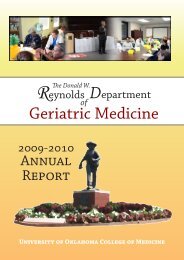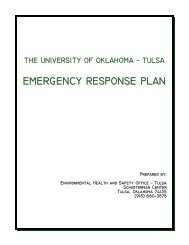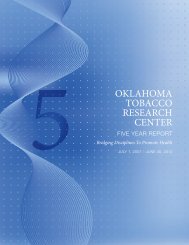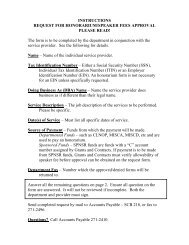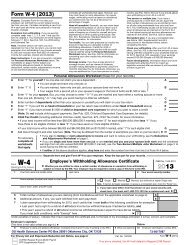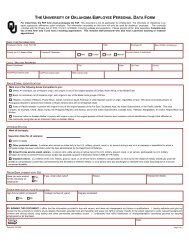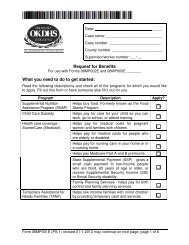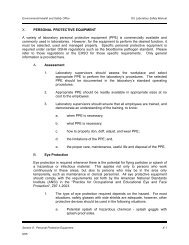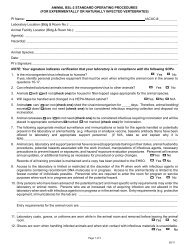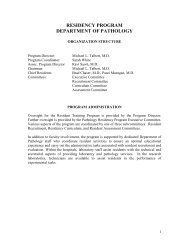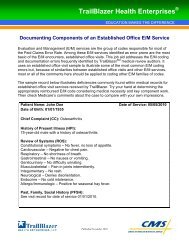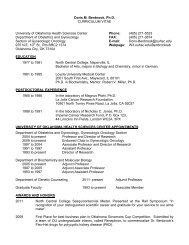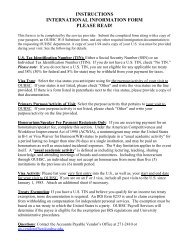The Unofficial Guide to First Year - University of Oklahoma Health ...
The Unofficial Guide to First Year - University of Oklahoma Health ...
The Unofficial Guide to First Year - University of Oklahoma Health ...
You also want an ePaper? Increase the reach of your titles
YUMPU automatically turns print PDFs into web optimized ePapers that Google loves.
UNOFFICIAL GUIDE<br />
How do I study for the lab exam?<br />
• STUDY THE HIPPOCRATES INTERACTIVE LAB GUIDE<br />
• All structures that will be tested on both parts <strong>of</strong> the lab<br />
exam are listed in the guide (your list <strong>of</strong> terms).<br />
• GO TO THE REVIEW<br />
• Dr. Blair will <strong>of</strong>fer a review session when the exam looms<br />
near. GO! <strong>The</strong> man knows anything and everything<br />
about the brain’s structures and is more than willing <strong>to</strong><br />
help you in any way possible. If a review is not scheduled,<br />
just ask.<br />
NEURO WRITTEN EXAM<br />
<strong>The</strong> written exam for Neuro usually consists <strong>of</strong> around 90 multiple-choice<br />
questions each written by the respective faculty member who presented the material.<br />
Usually, there are around three questions per hour <strong>of</strong> lecture time, and two per hour<br />
<strong>of</strong> clinical correlation. If it was mentioned IN CLASS, or IN THE SYLLABUS, it is<br />
fair game.<br />
How do I study for the written exam?<br />
• GO TO LECTURE. Most <strong>of</strong> the neuroscience faculty are great<br />
lecturers and <strong>of</strong>ten provide helpful ways <strong>to</strong> remember material or<br />
interesting anecdotes that relate <strong>to</strong> difficult material. Take your<br />
syllabus <strong>to</strong> class and just write done any extra tidbits they may <strong>of</strong>fer or<br />
anything that you found helpful, and I guarantee this will help when<br />
you come back around <strong>to</strong> studying the material. I also recommend<br />
that you give every pr<strong>of</strong>essor a shot. If they aren’t your cup <strong>of</strong> tea, no<br />
harm done. If you are a home-schooler, watch the lectures online.<br />
This takes much less time than actually getting <strong>to</strong> class and you can<br />
speed up if you understand it or rewind if you don’t get it.<br />
• DO THE PRACTICE TESTS. <strong>The</strong>se practice tests arrive a<br />
couple weeks before test block hits and are EXTREMELY helpful.<br />
<strong>The</strong>se tests are not only a reliable representation <strong>of</strong> test material<br />
but are also a good indica<strong>to</strong>r <strong>of</strong> where you stand as far as<br />
studying. I would suggest taking these as real exams after you feel<br />
comfortable with the material…don’t use any books, notes,<br />
syllabi, etc. and just see how you do. This will help let you know<br />
where your strengths are and the material you need <strong>to</strong> brush up<br />
on. If you have any questions about whether the content <strong>of</strong> a<br />
question is applicable or if the answer is correct don’t hesitate <strong>to</strong><br />
81




